The Pugnacious, Relentless Progressive Party That Wants to Remake America
https://portside.org/2016-01-14/pugnacious-relentless-progressive-party-wants-remake-america

Portside Date:
Author: Molly Ball
Date of source:
The Atlantic

At a recent private dinner in Manhattan, a small group of leftists plotted to take over America.
The group, a dozen community organizers and activists from all over the country, had convened at a sushi restaurant in the Flatiron District with the leaders of the New York-based Working Families Party. They were heads of organizations from Boston to Albuquerque, with names like National People's Action and Washington Community Action Network. And they were there to hear why their states should form their own chapters of the insurgent party, in order to capitalize on the country's rising liberal tide and push the national conversation leftward.
The party's deputy director, Jon Green, a pale, bespectacled 42-year-old, made the pitch. "In 2010, we saw the Tea Party yank the entire political discourse way to the right," he said. The Tea Party was powerful, he said, because it was boldly ideological; it recruited and groomed candidates; and it created a strong national brand. "Our view is that there isn't anything analogous to that on the left, and there ought to be." Heads nodded around the table.
The Working Families Party's agenda-frankly redistributionist and devoted to social equality-targets a class of Democratic elected officials who, in the view of many liberals, seem to listen more to their moneyed donors than to the left-wing rank and file. Aggressive, tactical, and dedicated to winning, the WFP would like to force Democrats-and the country-to become more liberal by mobilizing the party base, changing the terms of the debate, and taking out centrist incumbents in primaries.
If there's ever been a moment for this, it is now. Four years after Occupy Wall Street, with the socialist Bernie Sanders pushing Hillary Clinton leftward in the Democratic presidential primaries, liberal frustration with national politics has reached a boiling point. Enter the WFP: Since its founding nearly two decades ago, it's become an influential fixture of Democratic politics in New York, New Jersey, and Connecticut. Now, the party is going national. By mid-2016, the WFP plans to be in 11 states, with more on the horizon. Last month, the WFP endorsed Sanders after an online vote of its national membership. They may not yet be a household name, but a few years from now, they aim to be a national force.
Many of the activists in the dining room that night were there because they thought their states' liberals needed more edge. Javier Benavidez is the executive director of the Albuquerque-based South West Organizing Project, a community group that will help to launch the New Mexico Working Families Party later this year. In New Mexico, Benavidez said, labor and community groups had a good relationship. "But when it came to taking on corporate Democrats, there was a lot of hesitation."
Analilia Mejia, the crusading director of New Jersey Working Families, jumped in from across the table. "Here is what you say to them, verbatim: `Let us be the "crazy" left,'" she said. "`Let us be the voice that creates the space that allows you to negotiate for more of what you want.' You can't be for raising taxes? Let us say, `Tax the rich,' and then you can push harder."
From Sanders, Elizabeth Warren, and New York Mayor Bill de Blasio, to the Black Lives Matter movement and recent social-justice protests on college campuses, the activist left is enjoying a prominence not seen since the 1970s. The largest proportion of Americans now identify as "liberal" since Gallup began asking the question in 1992. As both cause and symptom of this moment, the WFP represents a sign of things to come for a Democratic Party still in the early stages of wrestling over what form it will take in the post-Obama era.
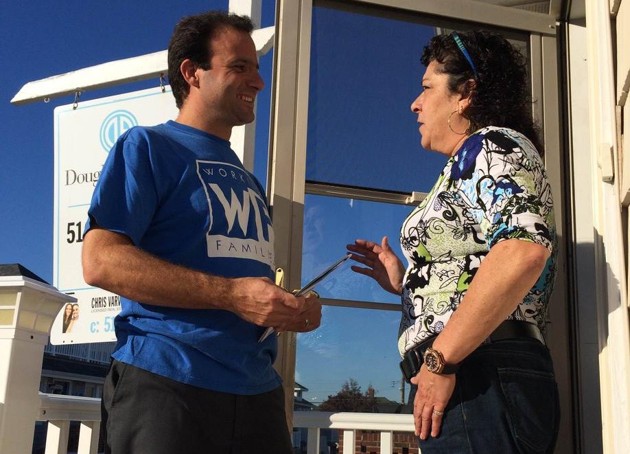
Long Beach, New York, city councilor Anthony Eramo, a Working Families Party member, speaks to a constituent. (Working Families Party)
Without the WFP, de Blasio, who may be the most powerful progressive in the country, would not likely be mayor. The party's Chicago partner helped to force Mayor Rahm Emanuel into Chicago's first-ever mayoral runoff as he sought reelection last year. It played a key role in increasing the number of blacks on the six-member Ferguson, Missouri, city council from one to three in the wake of that city's police-brutality protests. WFP-supported candidates have defeated incumbent Democrats in legislative primaries in Connecticut, New York, and Oregon, and party-supported candidates serve on city councils from Hartford to Chicago. The party has been instrumental in pushing issues such as government-mandated paid sick leave and a $15 minimum wage to the forefront of the national Democratic agenda.
As dinner wound down, the group traded war stories about disloyal Democrats and local fights. Charly Carter, the director of Maryland Working Families, complained that some elected officials seemed to lose the fire in the belly once they took office.
"It can be a real letdown," Carter said. "We are at war. And when you're at war, you don't need statesmen-you need gladiators. We elect them to be gladiators, and once they get there they want to be statesmen." Her tablemates nodded in sympathy. The implication was clear: Their mission was to ensure that Democrats couldn't get away with selling out their base.
The Working Families Party's bid for national prominence might seem like a long shot. But the party has succeeded in racking up electoral and policy victories in the places where it has long been active, starting with New York.
In the Empire State, where it was founded, the WFP is undeniably influential. It's a force in city politics, but also makes its presence felt in the state legislature. It arose as a result of the state's unusual fusion-voting system, in which candidates can run on the ballot lines of multiple parties-so, for example, a voter for former Mayor Michael Bloomberg would find him listed on the ballot twice, as the Republican candidate and as the candidate of the Independence Party.
The fusion system allows third parties to exert influence on the two established parties, offering them the chance to support major-party candidates rather than playing spoiler. The system has given minor parties an unusual role in New York politics, but while the Conservative Party has generally lived up to its name, the Liberal Party has not: In 1989, it endorsed Republican Rudy Giuliani. The betrayal outraged then-governor Mario Cuomo and prompted a revolt among a group of liberal union leaders and community activists. They formed the New Party in 1990; after some fits and starts, it became the Working Families Party in 1998. The party is controlled and funded by a board consisting of labor unions, such as the Service Employees International Union, and grassroots groups such as Moveon.org; its national president, a garrulous visionary named Dan Cantor, has a r,sum, that includes the Jesse Jackson presidential campaign and the now-defunct Association of Community Organizations for Reform Now, or ACORN.
Success for the nascent WFP came faster than its founders could have dreamed: In the 1998 election, the party's endorsed gubernatorial candidate, the Democrat Peter Vallone, received more than 50,000 votes on the WFP line (despite losing the race), guaranteeing the party ballot access going forward. It immediately started scoring policy victories: the state's first county-level living-wage ordinances; a statewide hike in the minimum wage passed over the veto of a Republican governor in 2004; and the first major reforms to the Rockefeller drug laws, set in motion by a WFP-backed African American candidate's primary defeat of a conservative Democratic district attorney in Albany.
We are at war. And when you're at war, you don't need statesmen-you need gladiators.
In 2003, Letitia James won election to the New York City Council on the WFP line alone, beating the Democratic candidate in the race and becoming the council's first minor-party representative in 30 years. That planted the seeds of the WFP's plan to take over the council. By 2009, the party had helped seven challengers win city-council primaries, many of them defeating Democratic incumbents, and backed a progressive councilman named Bill de Blasio's upset bid for the citywide office of public advocate.
Once in office, the WFP-backed council members joined with liberals already on the council to form an 11-member Progressive Caucus which, despite being a minority on the 51-seat council, quickly proved capable of driving the agenda-and tormenting then-Mayor Michael Bloomberg. Christine Quinn, the city council's speaker at the time, sided against the WFP on issues like paid sick leave, ending stop-and-frisk, and extending term limits; once seen as Bloomberg's inevitable successor, Quinn was routed in the 2013 Democratic primary. Today, de Blasio is the mayor of New York, James is the public advocate, the Progressive Caucus numbers 18 members, and the speaker is a former caucus chair named Melissa Mark-Viverito.
In short, America's largest city has gone from being run by a billionaire mayor and a party-machine council to being steered by a progressive mayor and progressive-driven council. In place of debates between Republicans and timid, triangulating Democrats, the fight in New York is now largely between moderates and activists on the left. (Even de Blasio now finds himself to the right of the progressives on the council, particularly on criminal-justice issues.) This is what WFP would like to accomplish nationally-on city councils and county boards, in stage legislatures, and in Congress.
"Here's what I'd say is the bottom line about the Working Families Party," Patrick Gaspard, the former White House director of political affairs who now serves as the Ambassador to South Africa, told me. As a young New York activist, Gaspard was a founding board member of the WFP. "They have values, they have high capacity for a relatively small organization, and unlike many on the left, they have a habit of winning." (Gaspard stressed that he was speaking in his personal capacity and not in his current professional role.)
The party relies on traditional labor- and community-organizing techniques. It maintains an army of paid canvassers year-round who can quickly mobilize voters for elections or initiatives. And it recruits and trains candidates at the ground level, seeding low-level local offices with sympathizers. In October, in a conference room on an upper floor of a Manhattan skyscraper, I watched a legal assistant named Francena Amparo dial for dollars in her reelection race to the Duchess County Legislature, the 25-person board that governs a Hudson Valley county more than an hour north of the city.
"Hi, Wilbur, are you there?" said Amparo, a Bronx-accented 38-year-old with flowing hair and a gap-toothed smile. "It's Francena, the county legislator from Duchess County. How are you doing?"
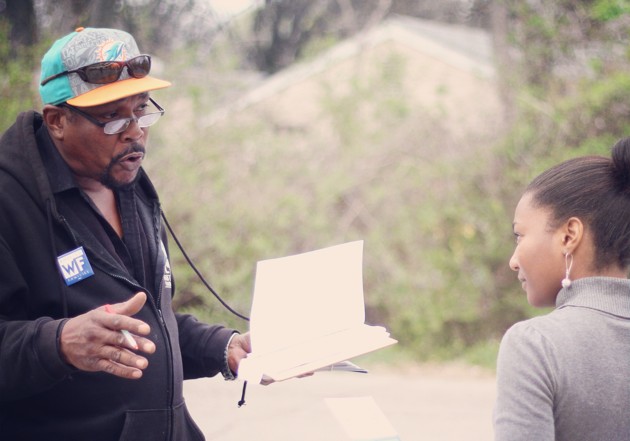
Working Families Party activist Reginald Rounds canvasses voters in Ferguson, Missouri. (Working Families Party)
Amparo had set aside two hours from her workday for fundraising calls-to family, friends, and even her doctor. She worked from a script-"I'm calling because I'm running for reelection and I need a boost in the home stretch"-and generally asked for $50 or $75. If she got a "yes," she handed the phone to one of the two hipsterish young African American WFP staffers in the room, who took credit-card information and added the donation to a spreadsheet. The most important point in the script, highlighted and underlined and all-caps, was to stop talking once you make the ask-when you wait for the other person to fill the silence, they usually say yes.
Amparo's total fundraising goal was just $7,500, and fewer than 2,000 votes would be cast in the election in November, where she was running as both a Democrat and a Working Families candidate, listed on both ballot lines.
The theory behind helping people like Amparo-a working-class, lesbian Latina who never saw herself as a potential officeholder until the WFP came calling-is that when seats open up for state legislature or Congress, it's these lesser officeholders that the Democratic Party will draw upon. (Many New York politicos say the WFP is more organized and effective than the state Democratic Party, and Democratic candidates routinely draw on WFP staff for their campaigns.) In the municipal elections across New York State in November, 71 of the WFP's 111 downballot candidates won-including Amparo, who beat her Republican challenger by just 21 votes.
Fiscally conservative but socially liberal, Andrew Cuomo epitomizes the sort of "corporate Democrat" the WFP despises.
But the WFP's story in New York is more complicated than this simple narrative of triumph. It has had a harder time outside New York City, particularly when it comes to the centrist Democratic governor, Andrew Cuomo, a skilled tactician who has repeatedly outmaneuvered the left.
Fiscally conservative but socially liberal, Cuomo epitomizes the sort of "corporate Democrat" the WFP despises. In his 2010 gubernatorial election, he threatened to refuse to run on the party's ballot line-a move that would have killed the party's ballot access-unless the party's leaders promised not to challenge his first budget. The WFP had no choice but to agree, and it was "incredibly disheartening" to the party's leaders and supporters to stand by in silence as Cuomo successfully passed a package of tax cuts for corporations and the rich, one former WFP staffer told me. (A party spokesman didn't dispute that the WFP gave Cuomo a pass on his first budget, but noted that the party successfully fought him later in the year on the expiration of a tax on high earners.)
In 2014, when Cuomo stood for reelection, the party had recruited a candidate to challenge him in the Democratic primary-a law professor and Occupy Wall Street leader named Zephyr Teachout. But when it came time for the WFP to make an endorsement and bestow its ballot line, the party was badly divided. Its old ally de Blasio, now the city's mayor (and, at the time, trying to curry favor with Cuomo to get his own agenda through the legislature), brokered a deal whereby Cuomo would get the WFP endorsement in exchange for a series of promises, such as campaigning for Democratic state-senate candidates and backing ethics and campaign-finance reforms. (Teachout nonetheless won a third of the primary vote, testament to the level of Democratic dissatisfaction with Cuomo.)
Cuomo took the deal. But once he got the endorsement, he brazenly reneged, flouting his former promises and even seeking to undermine the WFP by starting a new ballot line called the Women's Equality Party to confuse voters. In retrospect, WFP insiders view the Cuomo endorsement as a damaging miscalculation. But they take some encouragement from more recent developments: In a deviation from his usual fiscal conservatism, the governor recently came out in favor of a statewide $15 minimum wage. Coming from a pol seen as motivated purely by self-interest, Cuomo's move was a sign this liberal cause had become a political winner.
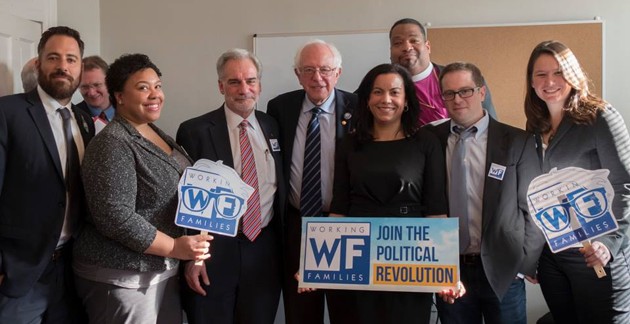
Presidential candidate Bernie Sanders with leaders and staff of the Working Families Party, from left: Rafael Navar, Katelyn Johnson, Bob Master, Sanders, Analilia Mejia, Dwayne Royster, Jon Green, Amanda Johnson. (Working Families Party)
It is an irony of the Obama era that, despite having a liberal Democrat in the White House, liberals often feel irrelevant to the national political debate. As Analilia Mejia piloted her gray SUV down a New Jersey highway, she considered the question of what ideas are considered politically reasonable.
There had just been another mass shooting, at a community college in Oregon, and the president had once again made a speech saying the gun situation was out of hand. On the radio, people were calling in to say that some things that might actually help-taking away people's handguns, requiring them to register with the government-were obviously ridiculous, out of the question. But why? That's what Mejia, the director of New Jersey Working Families, wanted to know.
A longtime union organizer who actually postponed her wedding to work on the Obama campaign, Mejia had previously served as New Jersey political director of the powerful mid-Atlantic janitors' union, SEIU 32BJ, whose 145,000 members can be found everywhere from Yankee Stadium to the Pentagon. The daughter of a Colombian garment worker and a Dominican laborer, Mejia, along with her younger sister, spent several early-childhood years with relatives in Venezuela after their father injured his back and could no longer support the family. "It was better to live on poverty-level wages in a shantytown in Venezuela than on a garment-worker's salary in Elizabeth, New Jersey," she told me as we inched forward in traffic. "That's crazypants."
Union work was satisfying but limiting for Mejia. Given the dramatic contraction of the labor movement, which has fallen to just 7 percent of private sector workers (in 1984, it was 16 percent), she longed to improve the lives of all workers, not just those lucky enough to be in a union. (In this sense, the WFP represents a stab at an American labor party, a common feature of European democracies that the U.S. has historically lacked.)
The WFP gives activists like Mejia an outlet for their frustration with national politics. It channels their anger at the constricting terms of the national debate into ground-level organizing-where the politics may seem unglamorously small-time, but there's a chance to make a difference in people's lives.
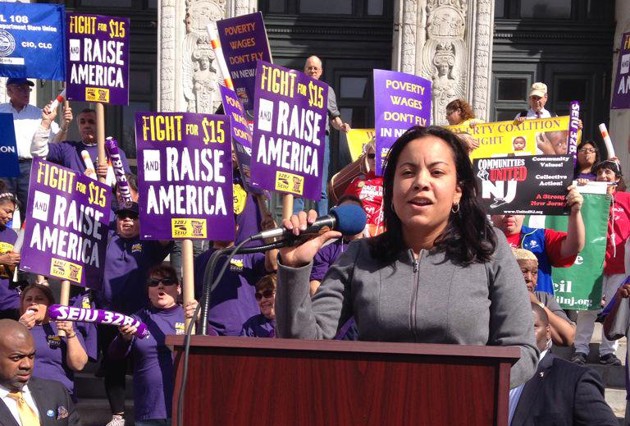
Analilia Mejia, the director of New Jersey Working Families, speaks at a rally. (Working Families Party)
"We've found ways of electoralizing our issues," Mejia told me. "We make politicians walk the walk-and pay the price if they don't." The idea is to make Democratic politicians more accountable to their liberal base through the asymmetric warfare party primaries enable, much as the conservative movement has done to Republicans. "The rules are rigged against working people, so we have to think outside the box to find different ways to win at this game," Mejia said.
When the Democratic-controlled New Jersey Legislature wasn't advancing a statewide paid-sick-leave bill, the WFP went to the municipal level to find a workaround; 10 New Jersey cities have now mandated paid sick leave. And when Governor Chris Christie vetoed a set of voting reforms-including automatic voter registration and restoring felons' voting rights-the party set out to collect signatures to put it on the ballot instead, hoping to put the issue before voters in November 2016.
Mejia has also spearheaded the party's role as Christie's chief harasser-a task the state's sclerotic, Christie-co-opted Democratic Party originally hesitated to take up. The WFP's protests, ethics complaints, and calls for Christie's resignation helped put the Bridgegate scandal on the map, severely wounding the presidential hopes of the man once considered a top 2016 GOP contender. The party also worked to elect Ras Baraka, an opponent of education reform, to succeed Cory Booker as mayor of Newark over a better-funded candidate. (WFP-style liberals generally side with teachers' unions in viewing education reform, which the Obama administration and many Democrats have championed, as a corporatist plot to undermine public education.)
Arriving in West Orange, Mejia pulled up to the venue for the evening's New Jersey Working Families gala, a banquet hall with a strong Jersey vibe: mirrors, marble, patterned carpet. Bumper stickers reading "Kicking Ass for the Working Class" were available at the check-in table. The evening's speakers included Representative Bonnie Watson Coleman, a liberal New Jersey lawmaker the WFP has championed since she was in the state assembly, and Representative Keith Ellison, the Minnesotan who co-chairs the Congressional Progressive Caucus. One testament to the party's growing local clout was that attendees included the chair of the New Jersey Democratic Party, John Currie, and the mayor of Jersey City, Steven Fulop, whom many local observers expect to be a top Democratic prospect for governor when Christie leaves office in 2017.
Until the party came along, Steven Fulop said, Chris Christie had largely succeeded in a strategy of "divide and conquer."
Just as even mainstream Republican politicians now feel obliged to kowtow to the Tea Party, the WFP, in the states where it is strongest, has begun to bend the Democratic establishment in its direction. "There has been a changing of the guard," Currie, the chairman, told me. "Many more of our elected officials are very progressive now."
Fulop, whose city was the first in New Jersey and the sixth in the country to adopt paid sick leave, told me the WFP represented the first "collective voice for the middle class" that New Jersey had seen in his memory. Until the party came along, he said, Christie had largely succeeded in a strategy of "divide and conquer" to "get Democrats to give up on our core values in the name of compromise," such as by agreeing to pension reform. Though he declined to tell me whether he was running for governor, it was clear that he saw cozying up to the WFP as the best way to signal his progressive allegiances in a potential Democratic primary.
"The Working Families Party provides a balance," he said. "That was missing, very much so."
Why would the left want a Tea Party? Mainstream Democrats and Republicans alike tend to see the right-wing movement as a pernicious force that has gridlocked national politics, simultaneously stymieing the president and hurting the GOP's image.
But to the leaders of the WFP, the right-wing movement's sudden rise was a revelation. "I watched the Tea Party achieve our goal in reverse," Dan Cantor, the WFP's national director, told me one day in his New York office. "They were able to pull the country hard to the right without a single ballot line." The Tea Party showed that you could be a political party-type actor while still operating mainly within the two-party system, through primary challenges and activism. It convinced Cantor that the WFP's incremental, fusion-based strategy was too limited, and that there were other ways to wring ideological purity from a party that was in the habit of selling out its most loyal supporters.
Then, in late 2011, the Occupy Wall Street protest movement erupted across the country. This was another eye-opening jolt for Cantor: "It raised the possibility of a new progressive moment," he said. The energy, he saw, was there to be tapped-it just needed organizers who knew how to channel it. Organizers, perhaps, like the WFP.
"Every good idea in American history started with a third party."
The WFP, Cantor explained, doesn't expect to overthrow the two-party system-nor does it want to be a hopeless cause like the Greens or the Libertarian Party. "Every good idea in American history started with a third party: abolition, the eight-hour day, women's suffrage, child-labor laws, unemployment insurance, Social Security," he said. "These didn't start with the Democratic or Republican Party-they started with the Free Soilers and the Liberty Party and the Populist Party and the Socialist Party. That's where these things germinate, and then when you do well, they get adopted by one of the major parties, or in very rare cases the major party collapses.
"So we're not na<ve," he continued. "The Democratic Party is not about to collapse. But we think there's a huge number of people inside the Democratic Party that actually agree with us, and we want the Democratic Party to be feistier, tougher, and more focused on the needs of ordinary people, not the preferences of their donors."
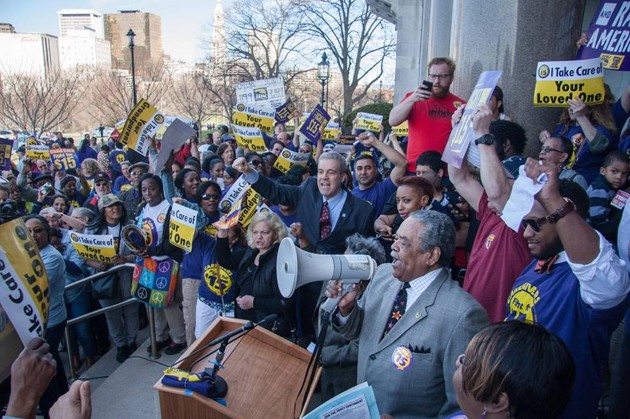
Ed Gomes, a Connecticut state senator and former steelworker, was elected on the Working Families Party line. (Connecticut State Senate Democrats)
It was in this spirit that the WFP made its presidential endorsement, of Sanders, in December. It was a move that had even some WFP allies scratching their heads: Why align themselves with a presidential candidate who is likely to lose, prompting questions about the WFP's clout and potentially alienating Hillary Clinton, who has tacked to the left in ways that satisfy many progressives? Clinton has also been endorsed by some of the WFP's stakeholder unions, putting them in a difficult position. The WFP risked coming across as the Bernie Sanders of political organizations: loud and angry, but ultimately a sideshow.
The WFP's stated goal is to help Sanders win. It decided to back Sanders after a vote by its governing board and an online survey of rank-and-file members, 87 percent of whom chose Sanders. But internally, party members see an upside to the endorsement even if he doesn't prevail. It's about expanding the party by tapping the energy Sanders has roused-and giving those new activists somewhere to go once the Sanders campaign has ended.
In 2013, the WFP was active in just four states-New York, Connecticut, New Jersey, and Oregon. Since then, it has opened chapters in Washington, D.C., Maryland, Pennsylvania, Illinois, Wisconsin, and Rhode Island, with New Mexico expected to join this year. "We wait for people to call us," Green, the deputy director, who is spearheading the national expansion, told me with a laugh. Usually, they're people who feel abandoned by their local Democrats.
"They're organizations that used to feel like they had power, mostly labor unions," Green said. "Public-sector unions used to feel like the Democratic Party had their back. Maybe that wasn't ever really true, but they're certainly seeing it's not true now. And low-income communities that once felt that the Democratic Party was the logical place for them to situate their politics-they see the Democratic Party drifting ever rightward, and being fine with the oppression of black people."
Green has firsthand experience with this process. In 2003, he was the director of the newly formed Connecticut WFP, the party's first foray outside New York, when leaders of the Democratic-controlled state legislature teamed up with Republican Governor John Rowland on a budget that resulted in layoffs for 2,300 unionized state workers. For the state employees' union, the American Federation of State, County, and Municipal Employees, "it was an awakening," Green told me. It was one thing for the Republican governor to float such a proposal, but the unions had counted on the Democrats to block him. "They felt like, `These are the people that have our back. They're Democrats-they're going to be there for us.' And they weren't."
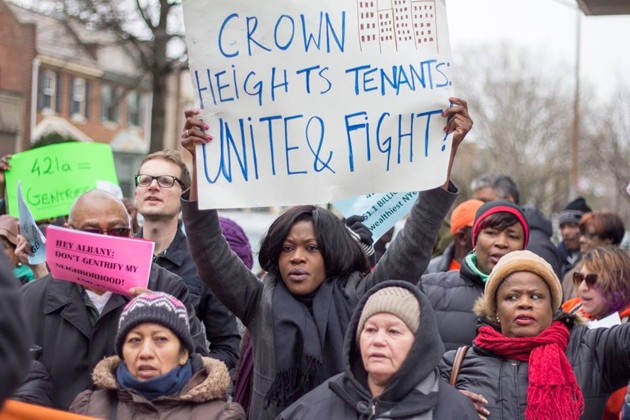
Diana Richardson, a Working Families Party member of the New York State Assembly, protests alongside tenants in Brooklyn. (Working Families Party)
Elsewhere in the country, the Tea Party is a model for what the WFP is trying to do. But in Connecticut, the WFP predates the Tea Party-and its clout is such that in 2010, when the Tea Party was rising nationally, a Connecticut Tea Party affiliate cited the WFP as an inspiration. The current majority leader of the state House launched his career with WFP backing. In 2009, in the wake of the financial crisis, New York and Connecticut were two of the only states to fill their state budget holes by raising taxes on the rich rather than merely cutting spending.
In Connecticut's 2010 Democratic gubernatorial primary, an underdog mayor named Dan Malloy attacked the front-runner, Ned Lamont, for his opposition to paid sick days, making it the subject of a blitz of TV ads. Lamont, formerly a liberal darling for his 2006 primary defeat of Senator Joe Lieberman, led in the polls right up to the eve of the primary-but Malloy ended up beating him by 14 points. Paid sick days had been proposed but blocked by the Democratic legislature in 2007, 2008, 2009, and 2010. Once Malloy took office in 2011, he quickly signed the nation's first statewide paid-sick-days mandate.
These days, Green gets a lot of calls from frustrated liberals looking for a way to pressure the Democratic Party from the left. In Wisconsin, the newly formed WFP wants to oust the Milwaukee County executive, Chris Abele, a wealthy businessman and ostensible Democrat who opposes tax hikes and supports privatizing government services. In Baltimore, the party is training candidates to take on city-council incumbents; in D.C., it is working to put a $15 minimum wage on the ballot. In Chicago, the same election that forced Emanuel into a runoff saw the council's progressive caucus increase from seven to 11 members. Now, Emanuel faces mass protests and a recall threat for his handling of police violence in the city.
The WFP has also succeeded in pushing its pet issues to the forefront of the Democratic agenda. One signature cause is government-mandated paid sick leave, a once-fringe idea that in the past year was mentioned in President Obama's State of the Union address, presented as a centerpiece of Hillary Clinton's economic agenda, and championed by Nancy Pelosi. Similarly, the party was an early champion of the $15 minimum wage, once considered unthinkable but now a reality in several large cities.
Is all this enough to deserve the "Tea Party of the left" label?
Is all this enough to deserve the "Tea Party of the left" label? That may be premature. Democratic divisions have yet to develop into the sort of government-shuttering national drama of the GOP's fractures, and the party's presidential primary has turned into a tedious coronation. The WFP's victories to date have been numerous but small-bore-a far cry from the Tea Party's attention-getting mass rallies and defeats of veteran U.S. senators. But the WFP would argue that, with Congress gridlocked and in Republican hands, more effective policymaking happens at the state and local level. The WFP's focus on municipal office also represents an attempt to leverage Democrats' concentration in urban areas. Like the Tea Party, the WFP bedevils mainstream Democrats. One Democratic elected official in a jurisdiction where the party is active lamented that its absolutist demands sometimes make governing impossible: "They're bomb throwers."
But the Tea Party and WFP alike view the traditional mode of bipartisan governance as a corrupt bargain. Making that harder is the whole point.
In mid-November, WFP staffers from across the country gathered for their first-ever national gala. Held in a dimly lit foyer of the national AFL-CIO headquarters, two blocks from the White House, the event featured a modest bar and forlorn-looking cheese tray. To one side, an imposing, 1950s-era, gilt-heavy mural of heroic laborers with a motto from Virgil ("Labor Omnia Vincit"); to the other, a canvas banner color-printed with WFP activists, carrying signs like "The Seas Are Rising & So Are We," "Hands Up Don't Shoot," and "I Am a Woman." A plaque identified the venue as the Samuel Gompers Room.
Heather McGhee, the president of the leftist think tank Demos, kicked off the proceedings. "You ain't seen nothing yet from the Working Families Party," she said. "We're electing leaders, we're winning on issues, and most importantly, we're changing what's politically possible."
McGhee, a black woman with long light-brown dreadlocks, ticked off the party's victories, starting with minimum-wage hikes and paid sick days. "We took down the Rockefeller drug laws, we won police body cameras, and we helped stop the abuse of stop-and-frisk," she said. "We stood up to the hedge funders who look at our schools and see dollar signs, from Bridgeport to Newark, from Philadelphia to Chicago.
"We've been working day in and day out to win on these issues and change the debate," she added. "And this here, tonight, what you're at, is our coming-out party. Because we are the people who believe that our economy should be measured in the health, happiness, and security of our families, not in corporate profits. We are the people who believe that democracy is for the people, not the super PACs. We are the people who know that economic inequality in America has always been built on the scaffolding of racial injustice."
At this, there was applause and shouts of "Amen!" "We are the people who believe that the future of our planet is worth more than the profits of oil and coal executives," she added. "And you know what? We deserve a political party, too."
"The local Democrats didn't want someone like me. Listen to my voice-it's very strong! You can't push me around."
A few minutes later, a slender, elegant, dark-skinned woman in a black silk gown took the stage. She was Diana Richardson, a member of the New York State Assembly from Crown Heights, Brooklyn; in a May special election, she became the first-ever New York state legislator elected solely on the WFP ballot line. Her campaign hinged on railing against gentrification and the "greedy developers" leaving the neighborhood's historic residents behind.
Speaking in a Brooklyn accent of Rosie-Perez-in-White-Men-Can't-Jump proportions, Richardson proclaimed, "The local Democrats didn't want someone like me. Listen to my voice-it's very strong! You can't push me around." The audience laughed and cheered. "But another party did want me," she added. "The Working Families Party."
Richardson exuded a powerful charisma-it was clear why her constituents had seen her as a champion, even if it was also clear why she wouldn't necessarily fit a major-party mold. If the Working Families Party gets its way, the future of the American left will look a lot less like Hillary Clinton-and a lot more like Diana Richardson.
[Molly Ball is a staff writer covering U.S. politics at The Atlantic.]
Related Stories:
